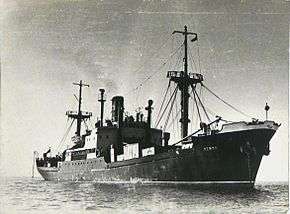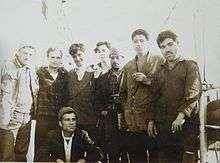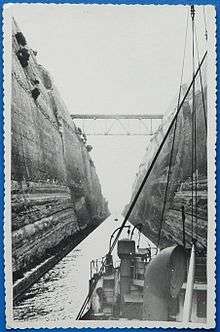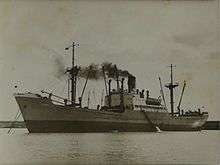SS Nezhin
Nezhin[1] (Russian:Нежин), was a merchant steam ship of Black Sea Shipping Company (Soviet Union) from July 1954 to 1965[3] and of Azov Sea Shipping Company (Soviet Union) from 1965 to 1978, tweendecker type general cargo ship. It was one of the Kolomna-class cargo ships, project 233.[5] The ship was named in honor of Nizhyn, Ukraine.
 Soviet steam ship Nezhin had black hull from the beginning. Photo dated before 1959. | |
| History | |
|---|---|
| Name: | |
| Namesake: | Kolomna-class cargo ships,[3] project 233[2] |
| Owner: |
|
| Operator: |
|
| Port of registry: | |
| Builder: |
|
| Refit: | Re-equipment for liquid fuel in 1961 |
| Fate: | scrapped in 1978 |
| General characteristics | |
| Type: | freighter, tweendecker |
| Tonnage: | |
| Length: |
|
| Beam: | 47 ft (14.4 m)[4] |
| Height: | Moulded depth 26 ft (7.9 m)[4] |
| Draught: | 21.8 ft (6.65 m)[4] |
| Propulsion: | Valce twin steam engine of "DMT 24 50/90" Lents built in GDR in 1952. 2,450 HP.[4][5] Single screw propeller had diameter 4.8 m.[4] |
| Speed: | |
| Capacity: | GRT = 3,258; NRT = 1,564[4] |
| Crew: | 36 persons + 18 passengers or cadets [4][5] |
History
The construction of the ship Nezhin commenced in 1953 in Rostock, GRD. The ship was built and handed over to Black Sea Shipping Company in July, 1954. Only two ships of Kolomna-class cargo ships was built for Black Sea Shipping Company: Nezhin and Smela. And both this ships were built in July 1954. All other Kolomna-class ships worked in other Shipping Companies of the USSR.
Voyages to Egypt and Syria
The Soviet Union first time offered politically and economic assistance to Syria in 1955 in case Syria had been refusing to join the Baghdad Pact (CENTO). Baghdad Pact was created as per initiative of the US, UK and Turkey military Association, including Iraq, Iran and Pakistan, whose main purpose was to fight against "Communist aggression".[6]
Soviet Foreign Minister Shepilov Dmitry Trofimovich visited Syria in June 1956. He offered that in addition to political and economic assistance can be military assistance from the Soviet Union to the young Syrian state.[7] In 1956 the first 60 specialists were sent to Syria, and began delivery weapons (from the fighter planes and tanks to ammunition) from Czechoslovakia with a total value of $18 million. At the end of the year, the Soviet Union and Syria signed first direct agreement on deliveries of weapons, jet aircraft and anti-aircraft guns, and also about the training of Syrian military personnel. At the same time, the countries of the Baghdad Pact organized economic pressure on Syria, including a boycott of Syrian goods.[6]


After voyage Soviet Union-Egypt-Soviet Union in May–June 1956, ship Nezhin passed to discharge cargo in Syria in summer 1956.
On 26 July 1956, Egyptian President Gamal Abdel Nasser gave a speech in Alexandria announcing the nationalization of the Suez Canal Company, owned by the French and the British, as a means to fund the Aswan Dam project in light of the British–American withdrawal (Withdrawal was completed on 18 July 1956).[8][9]
The nationalization of the channel led to the invasion of the British, French and Israeli troops and the beginning of the Suez campaign (October 1956 - March 1957). The channel was partially destroyed, part of the ships were sunk. Shipping was closed until 10 April 1957, when Suez Canal was cleared with the help of UN forces.[9]
The Nezhin often visited Syria and Egypt after 1956 also. Cargo for discharge in these countries was loaded in the Soviet Union.
The cargo for the Soviet Union
Nezhin loaded cotton bales in Egypt to discharge this cargo in Novorossiysk or in Kherson port for "Kherson cotton-paper factory", which was founded in 1952 and the first products were released in 1954.
Also the ship often loaded bauxite in Itea region, Greece, to discharge in Nikolayev. During this voyages and some voyages to Italy and back, Nezhin had to pass through Corinth Canal.
Voyage to Algeria
Since the beginning of the liberation war against colonial France from 1954 to 1962 the USSR rendered full support to Algeria. It included speeches in defense of the Algerian people in the United Nations, in various international forums, providing financial, material and military assistance, the organization of solidarity campaigns on an international scale with Algerians struggle for freedom and independence.[10] The ship brought cargo to Algeria. The ship dropped anchor at Algerian port and was awaiting free berth. Due to the war in Algeria one small military catter kept guard at the ship Nezhin to prohibit the ship from divers or torpedo boat attack.

8 of March, 1958 year, Yemen became a member of the United Arab Republic Confederation. Soviet experts began to build port facilities at Hodeida, "Ahmadi" port, in 1958.
The Nezhin brought cargo from the USSR to North Yemen, Hodeidah port.
Soviet Society of Red Cross and Red Crescent sent 10.000 tons of wheat to Yemen in 1959 to help in overcoming the effects of drought. But the steamer Nezhin carried military cargo to North Yemen mostly including tanks.
The above water part of the ship Nezhin hull was re-painted in light grey color, seems before 1960.
Only one voyage of Nezhin was from Black Sea to Ceylon and seems it was between end of 1959 and September 1960.
Reapair in Bulgaria
The ship's repair commenced in spring or summer 1960 and completed in the end of 1960 or in the first part of January 1961.
Preparations for the filming of movie "Striped Trip" commenced in April and May 1960.
Re-equipment of the ship for liquid fuel
After sailing from Bulgaria the ship Nezhin arrived in Odessa and commenced re-equipment for liquid fuel. Nikolay was signed off for vacation from the steam ship Nezhin on 16 January, 1961. His next ship was steamer Karaganda.
So, the steamer Nezhin became the motor ship Nezhin from 1961.
Azov Sea Shipping Company
Azov Sea region management of Black Sea Shipping Company was created in Zhdanov in 1953. Azov Sea region management was reorganized in Azov Sea Shipping Company in 1967. It is why some ships of Black Sea Shipping Company ships were handed over changed to Azov Sea Shipping Company and home port was changed from Odessa to Zhdanov. So, two sister ships Nezhin and Smela were transferred to Azov Sea Shipping Company in 1969 or in 1967.
Other photos
See also
| Wikimedia Commons has media related to Nezhin (ship, 1954). |
References
- Maritime Connector > SS Nezhin
- Водный транспорт. Нежин.
- NEZHIN - General Cargo Ship
- Particulars of head sister-ship Kolomna that mentioned in article: Пароход "Котлас".
- Все грани. > И в нашу гавань заходили корабли... (about sister-ship «СМЕЛА»). It is unreadable Cite for English Wikipedia.
- СИРИЯ И РОССИЯ: 70 ЛЕТ ВМЕСТЕ.
- "Soviet Bloc and Western Support for Economic Development in Syria" (PDF) (Office Memorandum ed.). McLean, Virginia: Central Intelligence Agency, Office of Research and Reports. 30 April 1957. pp. 49–50, 59–61 (totall pages 96). Archived from the original (PDF) on 5 November 2010.
- Goldschmidt 2008, p. 162
- "Искусственный Босфор": зачем Египту второй Суэцкий канал.
- Е.М. Богучарский. "СССР и Алжир. 60-е – 70-е годы ХХ века" (PDF). Новая и новейшая история. – 2008. – №3. pp. 51–64.
- Морской Флот СССР. > Суда ММФ СССР. > п/х Смела.